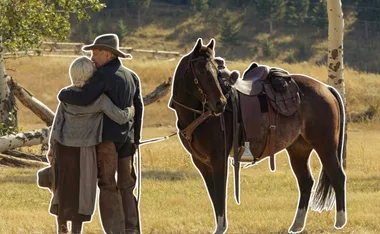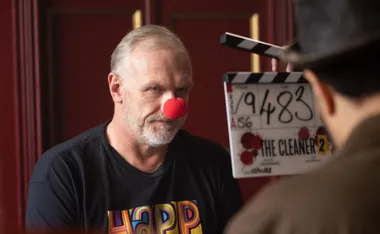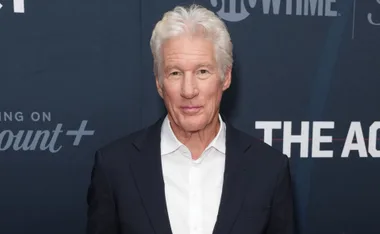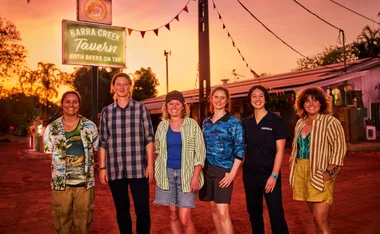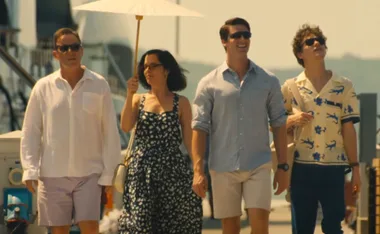‘Work to live, don’t live to work’. It’s the old adage that serves to remind us we shouldn’t be figuratively ‘killing’ ourselves just for a job.
But, in Japan, young professionals are literally dying over their work, and this shockingly common problem has been linked to wider aspects of their culture in unexpected ways.
In a special documentary Sex In Japan: Dying For Company, Marc Fennell takes viewers on a twist-filled journey to Japan.
The special episode of The Feed, which is set to air tonight at 7:30pm on SBS Viceland, begins with a peek behind the curtain at Japan’s problem with a ‘lack of sex’.
With the majority of young men and women aged between 18 to 34 in Japan not in any kind of relationship, the population is crashing and the number of babies being born has hit an all-time low.
Through his exploration of the dating issue, Marc comes across the crisis of overwork in Japan, which is pushing young people to suicide or Karōshi (death by overwork).
Before long, it seems apparent that the lack of sex in Japan might just be the symptom of a bigger problem.
We caught up with Marc to find out more about the unexpected twist in his documentary, and why he hopes you will tune in tonight.
TV WEEK: In the documentary you spoke with the mother of Matsuri Takahashi, a woman who committed suicide due to stress from overworking. She says, “I want the world to know how horrible the situation is in Japan.” Do you think your viewers will be shocked by the ‘situation’? I certainly was…
Marc Fennell: I certainly was shocked and I imagine anybody that’s ever done a day’s work will be quite surprised at how full-on it can be. Standing there in a graveyard in Japan in the shadow of Mount Fuji (at Matsuri’s grave-site, with her mother), you just suddenly realise how incredibly serious it is. It’s an incredible amount of bravery on behalf of that woman to want to stand up and tell the world about just how hard it was for her daughter, and how many more young men and women it affects.
I was blown away by the seriousness of the problem. We all talk about how many hours we do, but we sometimes forget about how full on it can be, and what the mental strain of that can be, and I certainly didn’t see it coming. When we embarked on the story, initially we thought we’d uncovered some interesting things about Japan’s sex life and instead we found something that was actually much more close to home, in a way. Something that really took my breath away was how much it affects people’s lives.

Matsuri Takahashi’s mother hopes to shed light on the crisis in Japan.
TVW: It was interesting to watch, because it goes from looking at this dating and sex problem, which is an issue in itself, and transforms in to something so complex…
M: When we were initially researching it we didn’t realise those two things were connected. Then slowly the more time we spent researching, the more time we spent talking to people, the more we realised actually they were deeply connected and that was a really interesting discovery that I don’t think we expected.
TVW: It’s a confronting discovery. I found it especially shocking that ‘death by overwork’ is so common they even have a word for it (Karōshi). It’s incredibly hard to pinpoint the root of a problem like this, but do you think overwork is sort of the main factor in all of these other issues (with the population decline and lack of sex)?
M: I’d be wary of saying it’s the ‘main’ problem, I think it’s a significant factor that hasn’t properly been explored. I’m very careful when I go do stories in other countries that we don’t make assumptions, that we’re being led by what the people on the ground are telling us. It seems Karōshi is this unanswered part of Japanese working culture that seems, based on the people that we spoke to, like it’s something that needs to be addressed before they can solve the problems of population.
TVW: From those conversations with people, is there any one thing you think could be changed to begin to solve the situation?
M: The interesting thing is that there are some pretty basic things that you could change. The limitations on overworking hours, it’s really easy to set that number lower. They have set it at a number, which is the same number of hours that reportedly Matsuri was doing when she died… so it’s really easy to set that number much, much, much lower. Quite a few people are advocating for that.
I guess we say it’s simple but the reality is that it actually speaks to both business interests, and a government desire to grow the economy. It’s also a cultural issue, as well, because work is so much a part of the national identity over there, so it’s actually quite a complicated thing to mandate rules on overtime per month. I can say that it’s simple, but the reality is that it actually crosses over into a bunch of really complicated areas that are a lot harder to unpick.

Marc spends time with a protester, who says she was overworked by her former employer.
TVW: It’s funny because, even just after watching the show just for thirty minutes, it made me sit back and think about my work and life, and you know I was going ‘I’ve got to be sure to take some me-time and relax.’ So I can’t imagine what living in that environment every day would do to you over a period of time…
M: The funny thing about it is, Claire (the producer) and I have been living and breathing this story for weeks. To the point that we sometimes look at each other and go ‘are we overworking ourselves? Are we becoming the problem?’ [laughs].
I’ll tell you the one thing for me personally, it did really make me sit back and think about the cost, and there is always a cost for these things. I love working, and I work multiple jobs and I love being busy and it’s really a big part of who I want to be. But you know I’ve got two small kids and it really made me think about the amount of time I spend working. It sort of stops you in your tracks a little bit.
TVW: And is that the message you hope to send? Why should the person reading this tune in tonight…
M: I really hope that when people watch it they take stock of how many hours they work, and consider if that is the best decision for them? I think, deep down, we all know whether we’re working too much.
Australians do work a lot. There is this perception of us of being these really laid back and relaxed people, but actually if you look at the stats we are this super hard working nation, that work really long hours.
I would hope there is a lesson in here, that we can all look at that and take stock personally about whether or not we are working ourselves too hard. Are we taking enough breaks? Are we giving ourselves enough leeway to recover at the end of each day and at the end of each week? That’s something that I hope that everybody who watches it does, take stock of themselves, because it’s very easy to look at this big problem in another country but it’s something that touches all of us, and it’s something everybody should think about.

Marc took the time to reflect on his own working life after filming the documentary.
The Feed’s special documentary Sex In Japan: Dying For Company airs Tuesday, 7:30pm, on SBS Viceland.
If you or someone you know would like to talk to someone about mental health, call Lifeline on 13 11 14 or visit their website at www.lifeline.org.au

